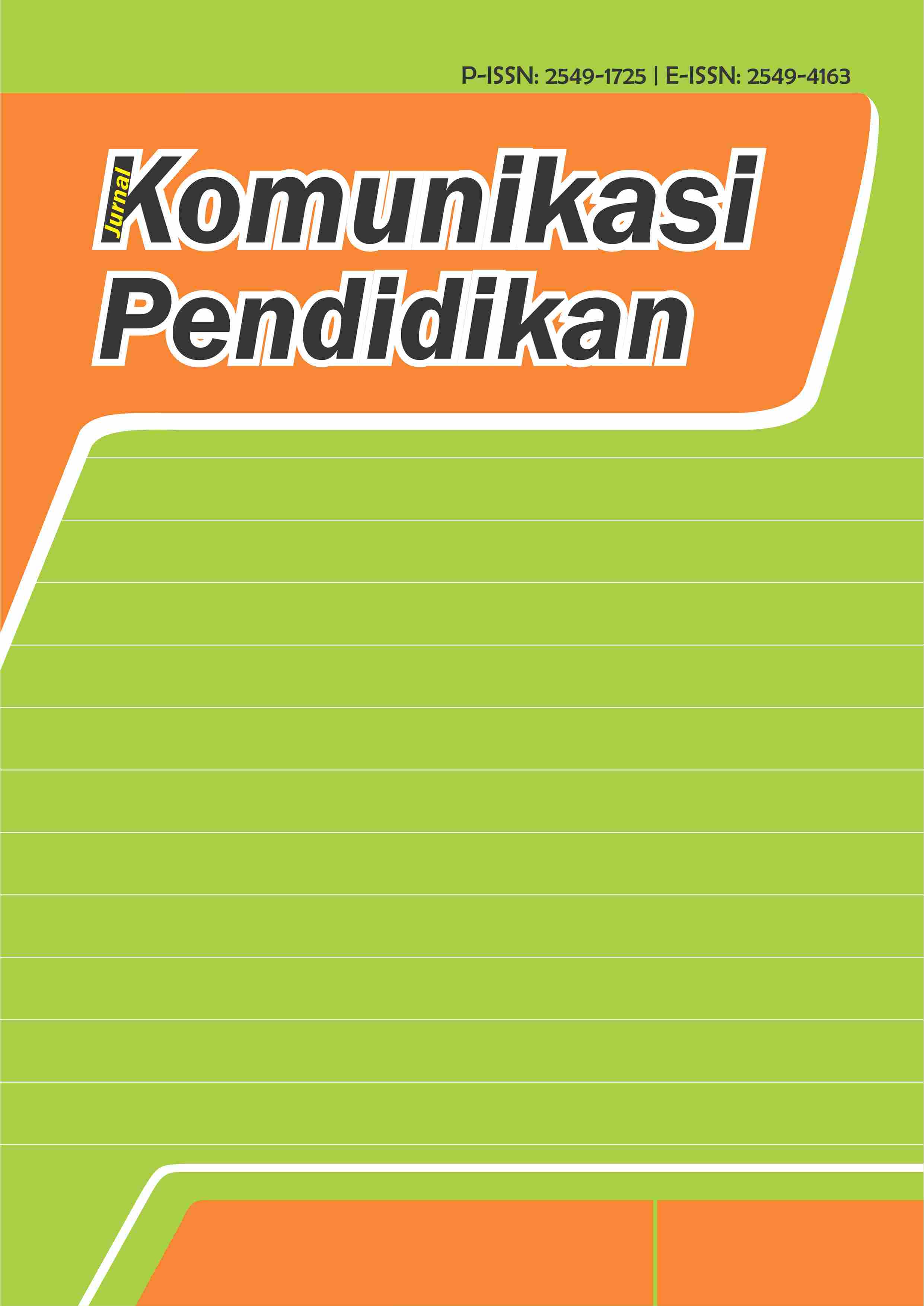Cultural Communication in the Preservation of the Traditional Marine Education Values of the Mandar Tribe on Kerayaan Island
DOI:
https://doi.org/10.32585/jurnalkomdik.v9i2.6283Keywords:
Cultural Communication, Preservation, Traditional Marine, EducationAbstract
Cultural communication plays an important role in maintaining and preserving the values of traditional marine education. In this context, cultural communication serves as a bridge to maintain traditional values while adapting them to the dynamics of the times in the era of modern life, especially the Mandar sailors on Kerayaan Island who have long been known for their maritime traditions inherent in their daily lives. This study aims to analyze the impact of modernization on the traditional practices and maritime cultural identity of the Mandar community. In addition, this study also presents the fact that not only the Bugis tribe is known as reliable sailors in the region, but the Mandar tribe also has a long history as accomplished sailors.
The method used in the research uses a qualitative approach with the type of ethnographic research. The data was collected through direct observation in the field and in-depth interviews with local communities. Social change analysis is used as a theoretical framework to understand the maritime cultural transformation that occurs.
This research shows that the entry of modern technology has slowly but surely changed the way of life of the Mandar seafaring community. Various cultural symbols that exist today are more widely used for economic purposes only, no longer as a cultural identity that is upheld. This study provides a real picture of how this change at least gives hope, that there will be no total death of traditional sized, there will always be adjustment, imaging and re-creation of new traditional authorities. The ability to survive this tradition is at least quite justified because the emergence of tradition always presupposes the presence of a 'regime of representatives' who has the authority to interpret the symbols and sacred texts of tradition for the purpose of legitimacy of power through cultural communication.
Keywords: Mandar Tribe; Culture; Technological Modernization, Social Change
Downloads
References
Hamid, AR,. (2022, November 3). Mandar Diaspora (2) : The Great Wave of Migration. Radar Sulawesi, 1–7. Www.Radarsulbar.Co.Id
Hamid, AR. (2021). Mandar Maritime Network: A Study on the "Twin" Ports of Pambauang and Majene in the Makassar Strait 1900-1980. Wave.
Alimuddin, MR (2005). Orang Mandar Orang Laut : Mandar Maritime Culture Navigating the Waves of Changing Times. Jakarta : KPG.
Anwar. (1998). Commercial Shipping of the Buton People in the XX Century. PSI Lemlit Open University.
Ayu, R. (2022). Misengi élo'na lopié: Studying the Message of Kutika in Bugis Maritime Culture. Manuscript, 12(2), 197. Https://Doi.Org/10.33656/Manuskripta.V12i2.206
Bronislaw Malinowski. (1992). Western Pacific Argonaut,. Routledge and Putra.
Creswell, J.W. (2013). Research Design of Qualitative, Quantitative and Mixed Approaches. Student Library.
Giddens, A. (2001). Runaway World: How Globalization Is Reshaping Our Lives. Gramedia.
Johanes Mardimin. (1994). Don't Cry Tradition, Cultural Transformation Towards Modern Indonesian Society,. Canisius.
Kingsley Davis. (1960). Human Society, Thirteenth Edition,. Mac Millan Company.
Lauer, RH (2003). Perspectives on Social Change (4th edition). PT. Rineke Cipta.
Mattiro, S. (2021). The Potential of Coastal Ecotourism Based on Local Wisdom. Mandala Education, 7/2, 220–225. Http://Ejournal.Mandalanursa.Org/Index.Php/JIME/Index
Mattiro, S. (2024). News from the Coast : The Other Side of Kerayan Island (1st Edition). Work Space.
Mattiro, S., Widaty, C., & Apriati, Y. (2023). Historical records of maritime culture and the integration of its values in shaping the independence of coastal ecotourism. Yupa: Journal of Historical Studies, 7(2), 194–210. Https://Doi.Org/10.30872/Yupa.Vi0.1937
Michael Southon. (1995). Boat Navel: Meaning and Value in the Maritime Trade Economics of Butonese Village. Canberra, ANU.
Moleong, LJ (2002). Qualitative Research Methodology. PT Remaja Rosdakarya.
Moore, W. E. (1967). Reading about social change. JSTOR, Vol. 46, N, 132. Https://Doi.Org/Https://Doi.Org/10.2307/2575356
Pelras, C. (2006). Bugis humans. Reason: Jakarta-Paris Forum.
Ronald Benge. (1975). Librarians and Cultural Change,. Cline Bubgky.
Salman, D. (2006). Maritime Universe. Ininnawa.
Smith, David and Evans, P. (1983). Marx's Capital for Beginners. Phanteon Books.
Soekanto, S. (1983). Sociological Theory of Social Change. In Jakarta Ghelia Indonesia (p. 23).
Soemardjan, Selo; Soemardi, S. (1964). A Flower of Sociology. LPFE-UI.
Spradley, JP (1997). Ethnographic Method. Tiara Discourse.
Suyatno, B. (2005). Social Research Methods ". Prenada Media Group.
Thorstein Veblen. (1953). Theory of Recreational Classes,. Mentor Book,.
Tiryakian, EA (1992). From modernization to globalization. In Source : Journal of Scientific Studies of Religion (Vol. 31, Edition 3).
Wahyuni, T. (2021). Maritime Culture and Mandar Shipping Routes. Journal of Maritime Anthropology, 10(1), 89-105.
Wegig Pratama. (2015). Sailor Character. Bahari Jogja, XIII (Sailor Character), 76–90.
William Fielding Ogburn. (1964). About Culture and Social Change,. University of Chicago.
Zuhdi, S. (2020). Maritime Culture as Capital for Building Indonesia's Maritime State (Vol. 8, Issue 2).
Published
How to Cite
Issue
Section
License
Copyright (c) 2025 Syahlan Mattiro

This work is licensed under a Creative Commons Attribution-ShareAlike 4.0 International License.
Authors who publish with the Jurnal Komunikasi Pendidikan agree to the following terms:
- Authors retain copyright and grant the journal the right of first publication with the work simultaneously licensed under a Creative Commons Attribution License (CC BY-SA 4.0) that allows others to share the work with an acknowledgment of the work's authorship and initial publication in this journal.
- Authors are able to enter into separate, additional contractual arrangements for the non-exclusive distribution of the journal's published version of the work (e.g., post it to an institutional repository or publish it in a book), with an acknowledgment of its initial publication in this journal.
- Authors are permitted and encouraged to post their work online (e.g., in institutional repositories or on their website) prior to and during the submission process, as it can lead to productive exchanges, as well as earlier and greater citation of published work.





